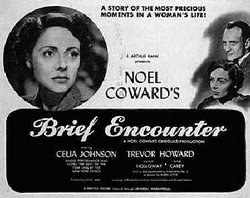Brief Encounter
|
|
BriefEncounter-TrainWindow.jpg
Brief Encounter (1945) is a British film directed by David Lean starring Celia Johnson and Trevor Howard.
The screenplay was written by Noel Coward based on his play "Still Life" (1936), one of a group of ten short plays entitled Tonight at 8:30, designed to be performed in various combinations of three (triple bills) as vehicles for Gertrude Lawrence and Coward himself. All scenes of "Still Life" are set in the refreshment room of a railway station (the fictional Milford Junction).
The film version prominently features the Piano Concerto No. 2 by Sergei Rachmaninoff on the soundtrack. Much of the film version was shot at Carnforth in Lancashire. Noel Coward makes the station announcements in the film.
It shared the 1946 Palme d'Or (Golden Palm) at the Cannes Film Festival. In 1999 it came 2nd in a BFI poll of British films, while in 2004 the magazine Total Film named it the 44th greatest British film of all time.
| Contents |
Synopsis
Two happily married people, both with children, both middle-class, meet by chance at a busy railway station. Laura Jesson always goes into town on Thursdays to go shopping or return books to the library and borrow some new ones. Dr. Alec Harvey is a general practitioner who, on Thursdays, has his practice closed while he regularly stands in at a hospital for Dr. Stephen Lynn, a colleague and friend of his.
Laura and Alec meet for the first time when he helps her remove a piece of grit from her eye. Their perfectly harmless meetings eventually turn into a love affair, which they keep secret from everyone else. As they have no other place to go, they intend to have sex at Dr. Lynn's flat. But Dr. Lynn comes home early from London and catches them together in his flat. Laura feels like a cheap prostitute, and it becomes clear for both of them that they will have to give each other up. Dr. Harvey, who has been offered a job in South Africa, now leaps at the chance. Their final meeting, again in the refreshment room where they saw each other for the first time, is spoiled by the arrival of Dolly Messiter, a distant friend of Laura's, who keeps talking and clinging to them so that there is no way for them to say good-bye to each other properly. Arriving home, Laura relives the affair in her memory and is comforted by her husband.
Comparison with the play
As is quite usual with films based on stage plays, the film shows most of the places which are only talked about in the play: Dr. Lynn's flat, Laura's home, a cinema, a restaurant, Boots. Additionally, a number of scenes have been added which are not mentioned in the play: a scene on a lake in a rowing boat where Dr. Harvey gets his feet wet; Laura wandering about alone in the dark, sitting down on a park bench and smoking in public; a drive in the country in a borrowed car.
Certain scenes are made less ambiguous and more dramatic in the film:
- The "explicit" scene where the two lovers are about to commit adultery is toned down. In the play it is left for the audience to decide whether they actually have sex or not. In the film, Laura has only just arrived at Dr. Lynn's flat when its owner comes home, and she is immediately led out by Dr. Harvey via the fire escape.
- When Laura wants to throw herself in front of an express train, the film confirms her intention by means of voice-over narration, but "she fails to take the Karenina way out and walks back to the buffet" (Frances Gray).
The film uses narrative techniques like frame stories and voice-over: the ending of the story is right at the beginning of the movie, which is then repeated at the end; and there is voice-over with Laura addressing her husband, or rather Laura imagining addressing her husband, in a dream-like state.
Criticism
In her book NoŽl Coward (Macmillan, 1987), Frances Gray says that Brief Encounter is, "after the major comedies, the one work of Coward that almost everybody knows of and has probably seen; it has featured frequently on television and its viewing figures are invariably high. Its story is that of an unconsummated [sic!] affair between two married people. [...]
"Coward is keeping his lovers in check because he cannot handle the energies of a less inhibited love in a setting shorn of the wit and exotic flavour of his best comedies. [...] To look at the script, shorn of David Lean's beautiful camera work, deprived of an audience who would automatically approve of the final sacrifice, is to find oneself asking awkward questions. A disastrous attempt in 1975 to remake the film in a more up-to-date setting, with Richard Burton and Sophia Loren as Alec and Laura, made this plain." [pp.64-67]
Gray's main argument: Why don't they just go ahead and do it? Why do they feel guilty, watched and hunted all the time? They do not seem to be particularly religious, so what's the problem?
For Gray, it is a problem of class consciousness: The working classes can be and also act vulgar, and the upper class silly; but the middle class is or at least considers itself the moral backbone of society (and also has always been Coward's main audience!)--a notion whose validity Coward did not really want to question or jeopardize.
External links
- Template:Imdb title
- Brief Encounter (http://www.screenonline.org.uk/film/id/456083/) at screenonline.org.uk

